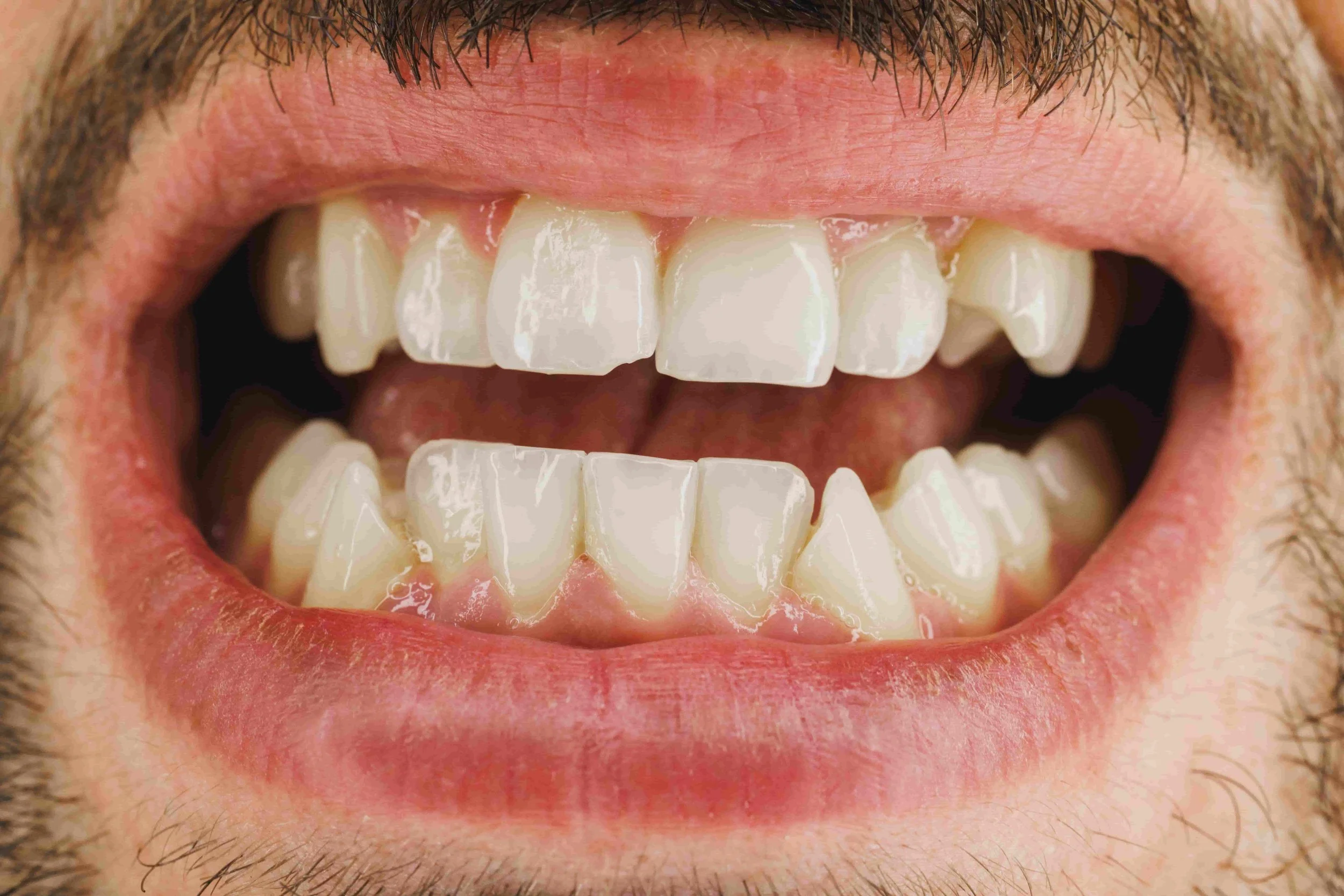How to Fix a Chipped Tooth at Home (Temporarily)
Not all chips are the same. Front tooth chips are often cosmetic, while back tooth breaks may involve decay or deeper damage.
Short-term home care can help. Rinse with salt water, use soft foods, and cover the front teeth’s sharp edges with wax or sugar-free gum (but only temporarily). Read more below.
Avoid DIY fixes. Never use superglue, file your tooth, or delay treatment if you're in pain.
Your bite might be the cause. Misalignment or night grinding can lead to repeated chipping; orthodontic treatment may help.
See your dentist ASAP. Even small chips need professional evaluation to prevent future damage or complications.
Chipping a tooth can be unsettling but don’t panic. Whether it happened while chewing something hard or during an unexpected fall, there are safe ways to manage a chipped tooth at home while you wait for professional care.
At Park Slope Dentistry Seventh Avenue, we see this more often than you might think. And while a chipped tooth can be uncomfortable or even a bit stressful, there are safe, simple steps you can take at home to protect it until we can take a closer look.
You’ve got this — and we’ve got you.
Identify the Type of Tooth and Severity
Before you reach for a home remedy, take a moment to assess what kind of damage you’re dealing with. Not all chips are equal and some require faster attention than others.

For Front Tooth Chips That Don’t Hurt (Cosmetic Only)
Front teeth are often chipped due to falls, sports accidents, or biting down on hard objects. The good news is that most anterior chips are cosmetic, meaning:
They typically don’t cause pain.
There’s no exposure of the nerve or deeper tooth structure.
They can’t be fixed at home, but some temporary steps may help.
What to do:
Rinse your mouth with warm water.
Gently brush with a soft-bristled toothbrush to keep the area clean.
If the edge feels sharp, you can apply orthodontic wax (available at most pharmacies) to prevent it from cutting your cheek or tongue.
This is only for short periods. It is not a long-term fix.Avoid biting into hard foods until your dentist sees it.
Why not DIY? Home "fixes" may trap bacteria, damage enamel, or mask a deeper crack, making professional repair harder down the line.
Even if a chip doesn’t hurt, it’s still important to let your dentist evaluate it. Tiny fractures can lead to long-term issues if ignored
For Front Tooth Chips That Hurt (Possible Nerve Exposure)
If your front tooth chip is accompanied by pain, bleeding, or swelling, the nerve may be exposed. These cases can escalate quickly and need prompt dental attention.
What to do while waiting to be seen:
Call your dentist immediately. This qualifies as a dental emergency.
Rinse with body-warm salt water to clean and soothe the area.
Apply a cold compress, wrapped in a towel, on the cheek or lip near the chipped tooth to reduce swelling.
Avoid chewing with the affected tooth completely.
Take ibuprofen if possible to help with pain and inflammation.
Use dental wax to cover sharp edges if needed, but keep it clean and change it frequently.
This type of damage can lead to infection or nerve exposure. The sooner we see you, the better the outcome.
For Chipped or Broken Back Tooth (Whether it Hurts or Not)
Chipped or broken molars may not always hurt but that doesn’t mean they’re not serious. Often, these are signs of deeper issues like decay, failing fillings, or structural fractures.
These chips might:
Expose sensitive inner layers of the tooth.
Worsen quickly with chewing.
Cause discomfort, or sometimes no pain at all.
What to do:
Call your dentist immediately, even if there’s no pain yet.
Rinse with salt water to minimize bacteria and soothe the area.
Avoid chewing on that side, especially anything crunchy, sticky, or hard.
Stick to soft foods like yogurt, rice, or well-cooked vegetables.
If the break is causing cold sensitivity or food impaction and there’s no pain, you can use temporary filling material or wax, just keep the area clean and avoid packing it too tightly.
Posterior breaks often get worse quickly and can affect the tooth’s root. We recommend scheduling a visit as soon as possible.
For All Tooth Chips (General Care Tips)
No matter the type or severity, here are a few universal tips for caring for chipped teeth at home:
Rinse with warm salt water daily.
Eat soft, non-acidic foods (scrambled eggs, mashed potatoes, smoothies).
Avoid temperature extremes (no hot coffee or ice water).
Use OTC pain relief if needed, never apply it directly to the tooth.
Avoid sugary snacks, which can aggravate the area.
Worried about your chipped tooth?
We’re here to help. Call (718) 768-1111 or Book Online to speak with a member of our team today.
What Not to Do (No Matter Which Tooth)
Even minor chips should be treated with care. While it's tempting to take matters into your own hands, some quick fixes can cause long-term damage and may even make professional repair more difficult.

Here’s what not to do while waiting to see your dentist:
🚫 Do not use superglue or household adhesives.
It might seem like a clever shortcut, but these products contain toxic chemicals that are not safe for your mouth.
They can irritate your gums, damage the tooth’s surface, and trap bacteria beneath the surface, setting the stage for infection or decay.🚫 Do not attempt to file the tooth yourself.
We know the urge to smooth a sharp edge is real, but using a nail file or sandpaper can remove healthy enamel, expose the sensitive inner layers of the tooth, and create rough, uneven surfaces that are harder to treat later on.🚫 Do not delay treatment if you’re in pain.
Pain is your body’s way of signaling that something deeper may be going on, like nerve exposure or a hidden fracture. Waiting it out can lead to more serious complications, including infection, abscesses, or the need for more invasive treatment like root canals.
Why not DIY?
Home “fixes”, even ones that seem harmless, can trap bacteria, mask deeper cracks, or interfere with proper bonding materials once you do get treatment.
In short: they might cost you more time, money, and discomfort in the long run.
Be kind to your tooth. Skip the shortcuts, keep the area clean and protected, and let your dental team guide you through a proper, lasting fix.
When to Call the Dentist (And What to Expect)
Signs You Need Urgent Dental Care
Don’t wait to make an appointment if you notice any of the following:
Persistent or sharp pain, especially when biting down or eating.
Swelling around the gum or face near the chipped tooth.
Bleeding that doesn’t stop easily.
A deep crack or visible break that goes beyond the enamel.
A sensation of tooth movement, looseness, or clicking.
What to Expect at Your Appointment
At Park Slope Dentistry Seventh Avenue, your comfort and clarity come first. Here’s how we typically approach chipped tooth visits:
Evaluation and Imaging
We'll examine your tooth and take any necessary X-rays to assess the depth of the damage.Symptom Relief
If you're in pain, we’ll provide immediate relief, whether it’s smoothing a sharp edge, applying a protective covering, or prescribing medication if needed.Repair Plan
Depending on the severity, treatment may include:Dental bonding for small cosmetic chips
A dental crown if the structure is compromised
Root canal treatment if the nerve is affected
Tooth extraction and implant, in rare severe cases
Your dentist will decide the best option based on what they see during the visit. Every case is different, and we’ll make sure you get the right care.
Aftercare Guidance
You'll receive detailed instructions to help your tooth heal properly and prevent future injuries.
We don’t just fix the break — we look into why it happened. Was it a one-time accident or a sign of chronic stress on the tooth? That distinction changes everything about how we choose to treat it. It’s how we make sure your repair is built to last.
– Dr. Freking
Read more about bonding with our Composite Bonding case study.
Could Your Bite Be the Problem? (Let’s Talk Alignment)
How Misalignment Can Lead to Tooth Chips
An uneven bite means some teeth take on more pressure than others when you chew or clench. Over time, this can wear down enamel, especially on front or back teeth that weren’t built to take that kind of stress.

This is particularly common if you:
Had orthodontic issues that were never treated or have relapsed.
Grind your teeth at night (often without realizing it).
Have existing crowns or fillings that slightly alter your bite.
The result? Small chips or cracks that keep coming back even with good brushing habits.
How Orthodontic Treatment Can Help Prevent Future Chips
Correcting your bite doesn’t just straighten your smile, it helps protect your teeth from further damage. In many cases, orthodontic treatment like Invisalign, traditional braces, or custom retainers can redistribute bite pressure more evenly.
Wondering if your bite is playing a role in recurring chips?
This is something worth discussing at your next dental visit. A simple evaluation can help your dentist or orthodontist spot signs of grinding, wear patterns, or misalignment, and build a preventive plan before more damage occurs.
We always evaluate how your teeth fit together and use digital scans to show you exactly what we see. Our goal is not just to fix problems, but to educate you so you feel confident and in control of your care.
– Dr. Freking
Final Thoughts: Home Care ≠ Permanent Fix
While there are safe ways to manage a chipped tooth at home in the short term, no home remedy replaces professional care.
To protect your smile long-term, here’s what you can do:
Wear a nightguard if you grind your teeth.
Stay on top of routine dental visits to catch wear early.
Eat a tooth-friendly diet — limit hard candies and avoid chewing ice.
Break habits like nail or pen chewing, which can put excessive pressure on your teeth and lead to chips over time.
Ask about bite assessments or orthodontic options if you’ve had recurring chips.
At Park Slope Dentistry Seventh Avenue, we’re here to treat the tooth and prevent it from happening again. If you’ve chipped a tooth, let’s take a closer look, together.
Need help? Book your appointment today. Your smile’s safety is our top priority.
Book Your Visit Today
Frequently Asked Questions (FAQ)
-
No, teeth don’t regenerate like bone or skin. Enamel doesn’t grow back, so even a small chip won’t heal naturally. That’s why it’s important to have a dentist evaluate it even if it seems minor.
-
If you're waiting a few days for your appointment, focus on keeping the area clean, avoiding hard foods, and using dental wax or sugar-free gum to cover sharp edges. If pain starts or gets worse, call your dentist, they may bring you in sooner or offer temporary relief options.
-
Many people don’t realize they grind their teeth until damage shows up. Signs include jaw soreness in the morning, flattened or chipped teeth, or unexplained headaches. If you're unsure, your dentist can usually spot the signs during a check-up.
-
Yes, people with misaligned bites, old dental work, weak enamel, or habits like ice-chewing or grinding are more prone to chips. Age, acid reflux, and some medications can also weaken enamel over time.
-
Most chipped tooth treatments are quick and minimally invasive, especially bonding. If there’s pain, it's usually from the chip itself, not the repair. Your dentist will make sure you're comfortable throughout the process.


